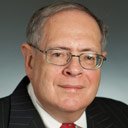Rupert M Barkoff

September 20, 2005 | New York Law Journal
FranchisingRupert M. Barkoff, a partner in the Atlanta office of of Kilpatrick Stockton, reviews the recent decision by the North Carolina Court of Appeals that held that a business effectively need not even have "physical presence" in the taxing jurisdiction for the state to impose an income tax; a decision which, if widely adopted, will increase costs and administrative burdens on all franchisors.
By Rupert M. Barkoff
8 minute read

September 21, 2011 | New York Law Journal
The Renaissance Franchise LawyerIn his Franchising column, Rupert M. Barkoff of Kilpatrick Townsend & Stockton discusses why franchising as a still-young legal discipline remains out of the mainstream in the industry, and provides hypotheses, like the fact that the focus is a cohesion of several sectors, as to why its popularity is merely budding.
By Rupert M. Barkoff
9 minute read

December 01, 2008 | New York Law Journal
FranchisingRupert M. Barkoff, a partner at Kilpatrick Stockton, writes: It has been a quiet year on the franchise front. In my observations, I have seen no landmark legal decisions. There have been a couple of new franchise statutes - Rhode Island passed a relationship statute, and South Dakota totally revamped its franchise disclosure law, making it mirror, to the extent possible, the FTC's amended Franchise Disclosure Rule. The amended Franchise Disclosure Rule's becoming effective was probably the highlight of the year, but that train had been traveling so long that it arrived not with a bang but a whimper.
By Rupert M. Barkoff
8 minute read

November 28, 2005 | New York Law Journal
FranchisingRupert M. Barkoff, a partner in the Atlanta office of Kilpatrick Stockton, writes that recent decisions from the Australian courts demonstrate that there are lessons to be learned from the Australian experience in franchising. These opinions, with their in-depth look at the use of earnings claims and other nonfinancial representations in connection with the sale of a franchise, are instructive to U.S. litigators and transactional franchise lawyers and could fill a void in our own jurisprudence.
By Rupert M. Barkoff
13 minute read

May 24, 2007 | New York Law Journal
FranchisingRupert M. Barkoff, a partner in the Atlanta office of Kilpatrick Stockton, reports that at the International Franchise Association's Annual Legal Symposium, held earlier this month in Washington, D.C., the recently promulgated revision was the center of focus.
By Rupert M. Barkoff
11 minute read

September 30, 2004 | New York Law Journal
FranchisingRupert M. Barkoff, a partner in the Atlanta office of of Kilpatrick Stockton, writes that it is intellectually refreshing - although pragmatically frightening - to see lawyers and their clients "bet the farm."
By Rupert M. Barkoff
6 minute read

September 24, 2009 | New York Law Journal
FranchisingRupert M. Barkoff, a partner at Kilpatrick Stockton, writes that there is an insidious trend developing in the franchise sales arena: Lawyers are being sued when bad things happen to a franchisee as a result of alleged defects or misdeeds in the franchise sales process.
By Rupert M. Barkoff
11 minute read

July 25, 2006 | New York Law Journal
FranchisingRupert M. Barkoff, a partner in the Atlanta office of Kilpatrick Stockton, asks: In the fray between advocates for strong control by franchisors and those who prefer the balance to tilt toward franchisees, who's right and who's wrong? And if there is an ideal model that accommodates the franchisor's and franchisees' separate but identical desire to be financially successful and to build value that at some point will be transferable to a third party, what might that model be?
By Rupert M. Barkoff
10 minute read

September 15, 2010 | New York Law Journal
Franchise Law: The Coming of AgeIn his Franchsing column, Rupert M. Barkoff, partner at Kilpatrick , writes that two recent happenings, totally unconnected, have provided a measuring rod for franchise law's development: The first is the recent passing of Alex Konigsberg, while the second relates to the decision handed down by the Supreme Court of Nebraska in State v.Orr.
By Rupert M. Barkoff
10 minute read
More from ALM
- Scan In Progress: Litigators Leverage AI to Screen Prospective Jurors 1 minute read
- Legal Speak at General Counsel Conference East 2024: Match Group's Katie Dugan & Herrick's Carol Goodman 1 minute read
- Legal Speak at General Counsel Conference East 2024: Eric Wall, Executive VP, Syllo 1 minute read



